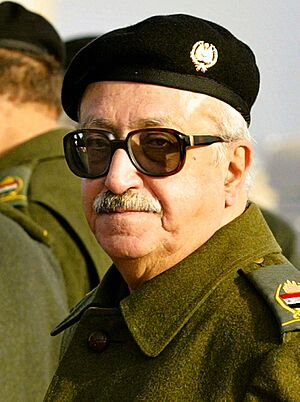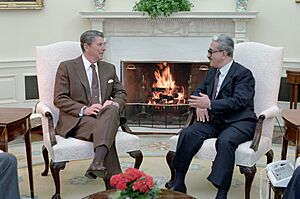Tariq Aziz facts for kids
Quick facts for kids
Tariq Aziz
طارق عزيز |
|
|---|---|

Aziz in 2001
|
|
| Deputy Prime Minister of Iraq | |
| In office 16 July 1979 – 9 April 2003 |
|
| Minister of Foreign Affairs | |
| In office 11 November 1983 – 19 December 1991 |
|
| President | Saddam Hussein |
| Preceded by | Sa'dun Hammadi |
| Succeeded by | Mohammed Saeed al-Sahhaf |
| Member of the Revolutionary Command Council | |
| In office 16 July 1979 – 9 April 2003 |
|
| Member of the Regional Command of the Iraqi Regional Branch | |
| In office 1 August 1965 – 9 April 2003 |
|
| Personal details | |
| Born | 28 April 1936 Tel Keppe, Kingdom of Iraq |
| Died | 5 June 2015 (aged 79) Nasiriyah, Iraq |
| Cause of death | Heart attack |
| Political party | Arab Socialist Ba'ath (until 1966) Baghdad-based Ba'ath (1966–1982) (Ba'ath – Iraq Region) |
| Spouse | Violet Yusef Nobud |
| Children | 4 |
| Profession | Journalist, politician |
Tariq Aziz (Arabic: طارق عزيز Ṭāriq ʿAzīz) was an important Iraqi politician. He was born on April 28, 1936, and passed away on June 5, 2015. He served as the Deputy Prime Minister of Iraq from 1979 to 2003. He was also the Minister of Foreign Affairs from 1983 to 1991.
Tariq Aziz was a close helper and friend to Saddam Hussein, who was the leader of Iraq. Their friendship started in the 1950s. Both were active in the Ba'ath Party, which was not allowed at that time. Aziz was a Christian, which was unusual for someone in such a high position in Iraq. He was also an Arab nationalist, meaning he believed in the unity of Arab people.
Because Saddam Hussein did not often travel outside Iraq, Tariq Aziz often represented Iraq at important meetings with leaders from other countries. He spoke for Iraq on the world stage. After the 2003 invasion of Iraq, Aziz was taken into custody by American forces. He was later held by the new Iraqi government. He passed away in prison in 2015 due to a heart attack.
Contents
Early Life and School
Tariq Aziz was born on April 28, 1936, in a town called Tel Keppe in northern Iraq. His family was Assyrian and belonged to the Chaldean Christian faith. Some people believed his birth name was Mikhail Yuhanna. They thought he changed it to Tariq Aziz, which means "glorious past," to be more accepted by the Arab and Muslim people in Iraq. However, his son said this was not true.
He went to Baghdad University where he studied English. After finishing school, he worked as a journalist. In 1957, he joined the Ba'ath Party. He later became the editor of important newspapers for the party, like Al-Jamahir and Al-Thawra.
Political Career

Tariq Aziz became more important in Iraqi politics after the Ba'ath Party took power in 1968. He was the only Christian in a high leadership role during Saddam Hussein's time. Saddam Hussein trusted Aziz a lot and helped him move up in the government.
From 1974 to 1977, Aziz was a member of the Regional Command. This was the highest group that led the Ba'ath Party. In 1977, he joined Saddam's Revolutionary Command Council. This council made important decisions for the country.
In 1979, Tariq Aziz became the Deputy Prime Minister of Iraq. His job was to explain Iraq's actions and plans to other countries. In 1980, he survived an attack in Baghdad. People from a group called the Islamic Dawa Party threw a grenade at him. Several people died in this attack. This event was one of the reasons for the Iran–Iraq War.
When Iraq invaded Kuwait in 1990, Aziz was the main person who spoke to the world about it. He said the invasion was fair because Kuwait's oil production was hurting Iraq's oil income. He also criticized other Arab countries for supporting the United States. In January 1991, Aziz met with the United States Secretary of State, James Baker, in Geneva. They talked about finding a peaceful solution to Iraq's occupation of Kuwait.
Iraq War and Detention
Before the 2003 invasion of Iraq, Tariq Aziz met with Pope John Paul II in Vatican City. He told the Pope that Iraq wanted to work with other countries, especially on disarmament. The Pope told Aziz that Iraq needed to follow the rules set by the United Nations Security Council.
After the invasion, Tariq Aziz gave himself up to American forces on April 24, 2003. His son helped arrange this. Aziz was worried about his family's safety. He was held in prison, first by American forces and then by the new Iraqi government.
While in prison, Aziz was a witness in some trials. In 2006, he spoke in defense of other Iraqi officials. He said they were not involved in the 1982 Dujail massacre. He explained that arrests were made after an attempt to kill Saddam Hussein. He also said that the Dawa Party had attacked him in 1980.
Aziz's family was allowed to visit him in prison. He was later moved to Camp Cropper near Baghdad airport. His son said that Aziz was not in good health but was treated well. He could make phone calls and receive parcels from his family.
Trials and Sentencing
Tariq Aziz faced several trials by the Iraqi High Tribunal. In April 2008, he was put on trial for the deaths of 42 merchants in 1992. These merchants were executed after being accused of raising food prices during a time of international sanctions. On March 11, 2009, he was found guilty and sentenced to 15 years in prison.
Later, on August 2, 2009, Aziz was found guilty of helping to force Kurds to leave their homes in northeastern Iraq. For this, he was sentenced to seven years in jail. However, he was found not guilty in another trial about an uprising in Baghdad in the 1990s.
On October 26, 2010, the Iraqi High Tribunal gave Tariq Aziz a death sentence. This was for his role in persecuting Islamic parties, including the Islamic Dawa Party, after a Shia uprising in 1991. His lawyer said that Aziz's job was only about Iraq's foreign relations and not about executions.
Many groups and countries spoke out against the death sentence. The Vatican, the United Nations, the European Union, and Amnesty International all asked Iraq not to carry out the execution. The President of Iraq, Jalal Talabani, later said he would not sign the order for Aziz's execution. This meant Aziz would stay in prison for the rest of his life.
Family Life
Tariq Aziz was married to Violet Yusef Nobud and they had four children. In 2001, his son Ziad was arrested for corruption. Ziad was accused of using his father's position to help with illegal trade. He was sentenced to 22 years in prison. Tariq Aziz tried to resign from his job, but Saddam Hussein did not accept it. Ziad was later released from prison.
Today, Ziad Aziz lives in Jordan with his wife and four children. Tariq Aziz's wife and another son also live in Jordan.
Illness and Death
Tariq Aziz suffered from several health problems while in prison. He had depression, diabetes, heart disease, and ulcers. He passed away on June 5, 2015, in a hospital in the city of Nasiriyah. He was 79 years old.
After his death, there was some confusion about his body. His daughter said his body was taken at Baghdad International Airport. However, Jordanian officials said the body was just delayed until all the necessary paperwork was completed. Tariq Aziz was later buried in Madaba, Jordan.
Images for kids
-
Ronald Reagan hosts Aziz at the White House, 1984
 | Laphonza Butler |
 | Daisy Bates |
 | Elizabeth Piper Ensley |



